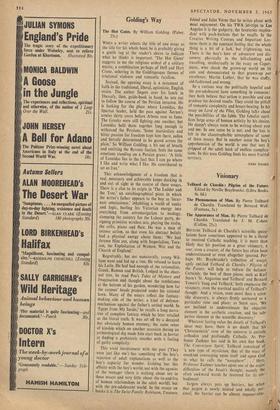Golding's Way
The Hot Gates. By William Golding. (Faber, 25s.) WHEN a writer selects the title of one essay as the title for his whole book he is probably giving a gentle tug at the reader's sleeve to indicate what he thinks is important. 'The Hot Gates' suggests to me the religious ordeal of a solitary mystic, a combination perhaps of Hell and Hart Crane, ushering in the Goldingesque themes of irrational violence and romantic fatalism.
Instead, the opening essay is a testament of faith in the traditional, liberal, optimistic, English strain. The author lingers over his lunch in Thessaly, then, guide-book in hand, he sets out to follow the course of the Persian invasion. He is looking for the place where Leonidas, the Spartan leader, held the pass against Xerxes's armies thirty years before Athens rose to fame. The Greeks were still fighting one another, but Leonidas held them together long enough to withstand the Persians. `Some inarticulate and bitter passion for freedom kept him there, sullen and fiercely determined as he gazed across the plain.' So William Golding, a bit out of breath and omitting the Byronic fustian, feels the same emotions standing on a Persian grave: 'A little of Leonidas lies in the fact that I can go where I like and write what I like. He contributed to set us free.'
This acknowledgment of a freedom that is real, necessary and achievable keeps ducking in and out of sight in the course of these essays. There is a clue to its origin in 'The Ladder and the Tree,' an autobiographical piece in which the writer's father appears to the boy as 'incar- nate omniscience,' inhabiting .a world of sanity and logic, hurling his Victorian energy into everything from astronavigation to zoology, stumping the country for the Labour party, de- signing primitive wireless sets, playing the violin, the cello, piano and flute. He was a man of intense action, so that even his abstract beliefs had a physical energy about them: 'We had thrown Him out, along with Imperialism, Tory- ism, the Exploitation of Women, War and the Church of England.'
Regrettably, but not unnaturally, young Wil- liam went and hid up a tree. He refused to learn his Latin. He bad had enough of the rationalists, Greek, Roman and British. Lodged in the chest- nut tree, he read Poe's Tales of Mystery and Imagination and thought about the tombstones at the bottom of his garden, wondering how far the corpses' heads projected under his rational lawn. Many of the essays reflect .ffie fantasy- making side of the writer, a kind of defence- mechanism against the father's settled world. In `Egypt from My Inside,' he recalls a long narra- tive of complete fantasy which he later retailed as the literal truth. It was set off by a decayed but obviously human mummy, the same sense of kinship which on another occasion during an archeological dig made him start back in horror at finding a prehistoric murder with a feeling of guilty complicity.
This vivid involvement with the past (`They were just like me') has something of the boy's rejection of adult explanations as well as the boy's capacity for wonder. Golding has this affinity with the boy's world, not with the agonies of the teenager (there is nothing about sex in these essays and very little about the to-and-fro of human relationships in the adult world), but with the pre-adolescent world. In the essays on books it is The Swiss Family Robinson, Treasure Island and Jules Verne that he writes about with most enjoyment. On his TWA jet-trips to Los Angeles it is the gadgetry, the lavatories resplen- dent with push-buttons that he recalls. In the Creative Writing Courses and Important Lec- tures there is the constant feeling that the whole thing is a bit of a lark, but frightening, too. There is the boy's love of adventure and dis- covery, physically in the hill-climbing and travelling, intellectually in the essay on Coper- nicus, who shook the grown-up world on its axis and demonstrated to that grown-up par excellence, Martin Luther, that he was stuffy, old-fashioned and wrong.
In a curious way the politically hopeful and the pre-adolescent have something in common: they both believe that action is possible and can produce the desired results. They avoid the pitfall of romantic complexity and breast-beating. In his essay on Lord of the Flies, Golding talks about the possibilities of the fable. The fabulist sacri- fices large areas of human activity by his choice. He doesn't always seem to be writing about you and me. In one sense he is not, and the loss is felt in the claustrophobic atmosphere of some of these essays. But in another sense the boy's apprehension of the world is one that sees it stripped of the adult husk of endless complica- tions. In this area Golding finds his most fruitful territory.






































 Previous page
Previous page